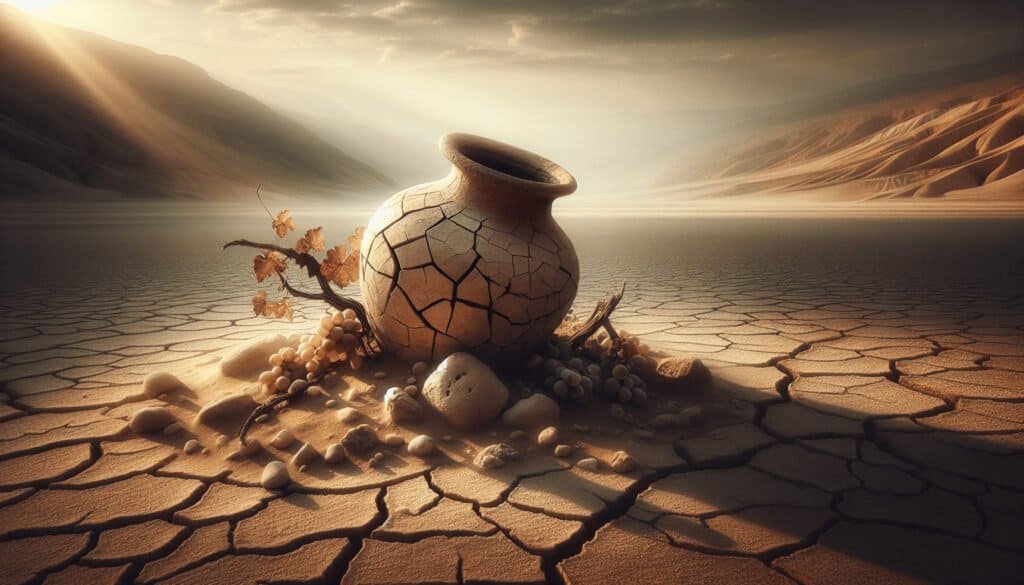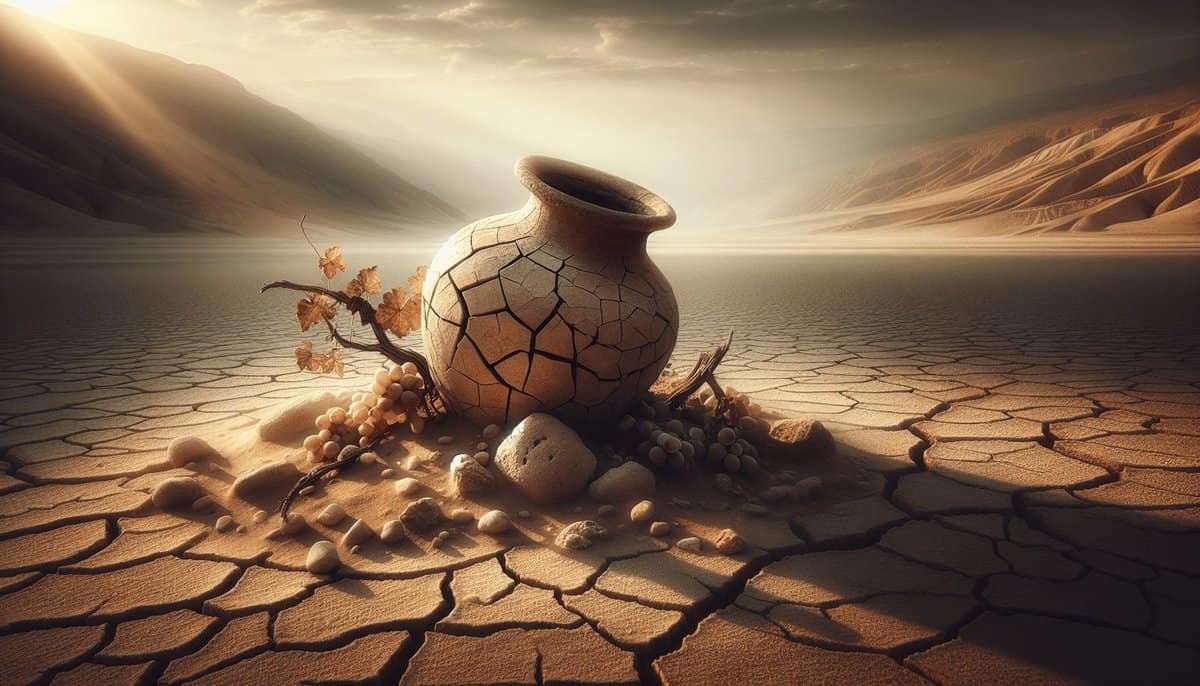What if the ancient world offered us a mirror, reflecting our own moral dilemmas back to us? As you ponder this idea, you may find yourself led to the mystical shores of the Dead Sea, an area steeped in history, spirituality, and, most intriguingly, a lamentation for the moral decline encapsulated in the artifacts found there.
The Dead Sea: A Unique Location
The Dead Sea, known for its dense mineral content and extreme salinity, isn’t just a natural wonder; it’s also an archaeological goldmine. If you’ve ever dreamed of a place that feels otherworldly while simultaneously brimming with human history, this is it. With its geographic extremes lying at the lowest point on Earth, the surrounding areas have given rise to a wealth of historical texts and artifacts that provide snapshots of societal values in different epochs.
Historical Background
Settlements surrounding the Dead Sea date back thousands of years. Interestingly, these communities were deeply intertwined with the Jewish faith. From the Essenes of the Second Temple period to early Christian sects, the region played a pivotal role in shaping cultural identity. More than just a site of personal reflection, it hosted scrolls and texts that would later illuminate moral quandaries and spiritual crises.
Archaeological Significance
Among the treasures unearthed in these arid terrains are the Dead Sea Scrolls, which consist of ancient manuscripts that shed light on biblical texts, community rules, and even prophecies. Historians and theologians alike scrutinize these scrolls to understand the ethical frameworks that prevailed during their time. The revelations from this area provoke puzzling questions about moral integrity and virtue that remain relevant today.
The Dead Sea Scrolls: A Peek into Moral Perspective
If you’ve ever thought about how artifacts encapsulate a people’s values, then the Dead Sea Scrolls are a perfect case study. These scrolls are not mere documents; they represent the beliefs, hopes, and moral struggles of ancient peoples.
What Are the Dead Sea Scrolls?
The Dead Sea Scrolls, discovered between 1947 and 1956 in the Qumran Caves near the Dead Sea, consist of over 900 documents. They are more than just religious texts; they include community rules, religious laws, and even theological reflections that signal varied approaches to ethics and morality. They provide insights into how ancient peoples grappled with moral decline—an ongoing struggle that resonates with our contemporary society.
Moral Dilemmas Presented
The Scrolls often delineate between light and darkness, good and evil. In a society marked by turmoil, these texts grapple with ethical ambiguities. So, what does this mean for you? The struggles faced then can mirror the perplexities you’re facing today in your moral compass. According to the Scrolls, a community’s strength was evident in its ability to confront moral decline head-on.

The Cultural Context of Moral Decline
Before diving into the specifics of moral decline, let’s address culture. Culture acts like a tapestry; each thread represents a belief, value, or tradition. The intricate weaving of these threads forms the backdrop against which moral decisions are made, both in ancient and contemporary contexts.
Ancient Societies and Their Values
When you think about the communities around the Dead Sea, consider what constituted moral fiber. These societies often emphasized collective well-being over individualism, fostering a deeper sense of responsibility. The ethical dilemmas noted in the Dead Sea Scrolls highlight the importance of community standards and pressures.
- Collectivism vs. Individualism: Ancient communities thrived on shared values, whereas today’s society often leans towards individual interests.
- Accountability Structures: Mechanisms to ensure moral behavior have shifted, raising questions about who holds individuals accountable.
Modern Parallels: Is There a Moral Decrease?
You might be wondering if we’re witnessing the same moral decline. Whether through debates about integrity in politics or ethics in tech, you can’t help but notice a pattern where individual benefits often overshadow the collective good. What lessons, then, can we extract from the ancient texts?
Scriptural References: Morality in the Texts
The Bible serves as a rich repository for moral purpose and consequence. When we think of scripture, it’s essential to not only see it as religious literature but also as an ethical guide offering principles that can still resonate with you today.
The Role of Prophets and Writings
In Biblical times, prophets served as moral compasses. They weren’t passive observers but vocal critics warning against societal decay and ethical contradictions. For instance, the words from Jeremiah lamented societal failing, asking if they had forsaken the “fountain of living water.” These sentiments echo through history and can stir similar feelings of concern about our present circumstances.
Key Themes in the Scriptures
- Accountability: The texts reinforce that accountability to a higher standard is crucial.
- Consequences: There’s a prevailing theme that moral decline leads not only to spiritual but also societal consequences.
- Redemption: Hope is a recurring motif, reinforcing that it’s never too late for societal or personal redemption.

Archaeological Findings: Evidence of Decline
The materials discovered in this region often depict humans wrestling with moral questions. Artifacts—largely pottery and tools—can unveil individual and communal actions that reflect ethical standings.
The Pottery as a Reflection of Societal Values
Think about pottery fragments as symbols of daily life—the styles, decorations, and uses can tell you a lot about what people valued. It’s saying something profound about their families, communities, and, ultimately, their ethics.
| Artifact Type | Implications for Morality |
|---|---|
| Cooking Pot | Domestic stability and the importance of family but also potential neglect if left broken. |
| Oil Jars | Commerce and trade ethics; were they driven by greed or fair dealings? |
| Ritual Items | Reflections on religious or ethical practices, which also raises questions about their sincerity. |
The Qumran Community: A Case Study
The Qumran community, thought to be associated with the Essenes, serves as an intellectual touchpoint for understanding moral stances during a crisis. Isolating themselves, they were intentional about living out their values.
- Strict Adherence to Laws: Their focus on purity laws illustrates a desire for moral rectitude in a world perceived to be declining.
- Lamentations in Practice: Rituals, similar to those demonstrated in the Scrolls, showcase their emphasis on atonement.
A Comparative Look: Then and Now
Societies evolve, but the fundamental struggle with ethical dilemmas remains constant. Don’t you ever feel that echoes of ancient moral conflicts reappear in your contemporary life?
Ethical Turmoil Through the Ages
- Political Integrity: Much like ancient leaders who faced scrutiny, today’s political landscape often promotes ethical questioning.
- Environmental Responsibility: The ancient texts emphasize stewardship—a principle neglected over centuries that’s coming back to the forefront.
- Cultural Norms: As societies evolve, emerging cultures either challenge or reinforce previous ethical constructs.
Ethical Relativism Today
The idea that morality is subjective can be both liberating and confusing. In ancient history, moral codes were often non-negotiable. Today, this flexibility leads to both innovation and ethical chaos.
Lessons from the Dead Sea Vineyard
So, what can the Dead Sea Vineyard teach you about today? It tells a tale of the inherent struggle between moral decay and the pursuit of virtue. By linking the past with your present, you may find fresh insights that can guide your choices in your daily life.
Emphasizing Community Values
Wouldn’t it be refreshing to shift the focus back to community ethics? Just as ancient societies relied on shared beliefs, you could nurture a culture of accountability around you.
Rediscovering Rituals
Incorporating rituals—whether through family traditions, meditation, or communal gatherings—can fortify your ethical framework.
Navigating Modern Moral Dilemmas
The next time you grapple with ethical decisions, remember the lessons from the Dead Sea Scrolls. Reflect on your responsibilities to others, weigh decisions against shared values, and ask: “What would my community see as the right choice?”
Conclusion: Reflections from Jars of Moral Lament
As you contemplate the lessons of the Dead Sea Vineyard, consider the words of the ancient prophets as guiding whispers in your own life. The echoes of moral decline are not just relics of the past; they serve as reminders to honor the wisdom of those who faced similar challenges.
Today’s world can feel overwhelming, but your personal choices carry weight. By understanding where history and modernity collide, you’re better equipped to address prevailing moral dilemmas. With a freshly illuminated perspective and a deeper appreciation for collective responsibility, you just might transform your moral landscape.
The Dead Sea Vineyard remains more than a historical site; it’s a testament to humanity’s enduring quest for higher ethical ground. What legacy will you choose to contribute to this ongoing narrative?



